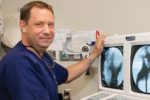Providence Medical Center
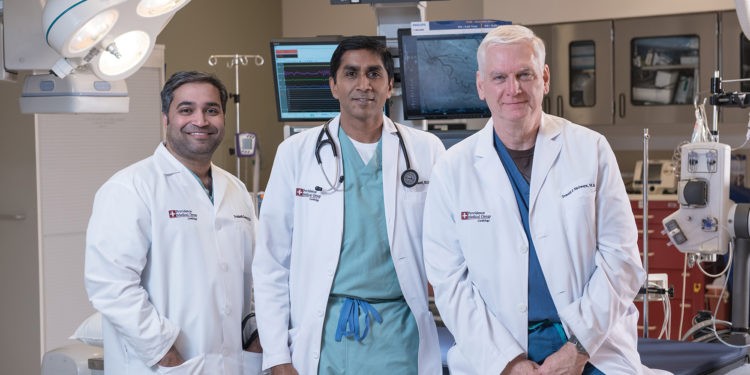
Keeping a Steady Finger on the Pulse of Exceptional Cardiac Care
Knowing the greatest wealth is health, the beat goes on for this dynamic group of interventional cardiovascular specialists who keep patients’ best interests at heart.
Photos by Matt Kocourek
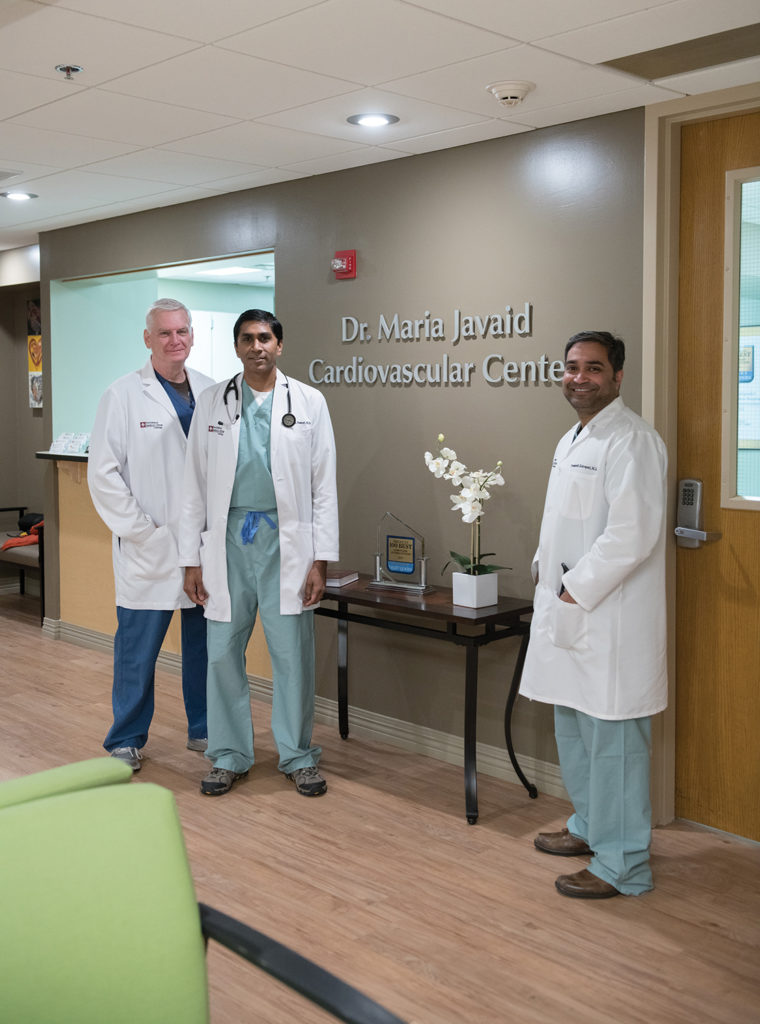
The Providence Medical Center was recently renamed the Dr. Maria Javaid Cardiovascular Center in honor of her inspiring dedication to both her patients and the hospital.
By definition, providence refers to the protective care of God or of nature as a spiritual power. To put one’s trust into providence is to discover a source of comfort. Providence Medical Center certainly lives up to its name in that regard. It has a genuinely welcoming presence coupled with a steady sense of calm that seems to remain prevalent even during the most tumultuous of medical emergencies. It’s easy to understand why this center of medical care, or better still, center of medical excellence, is a trusted source of care for not only the surrounding community but the Kansas City area as a whole. It is almost like a hidden gem, tucked in the rolling hills off Parallel Parkway just a stone’s throw east of The Legends Outlets off Interstate 435. In fact, even for those who do not reside in the neighborhood, navigating one’s way to this award-winning hospital can easily be done from all points of the metro area, and once folks discover the multiple levels of care delivered at the hands of some of the most trusted, experienced and gifted physicians in the area, it just makes sense to make Providence Medical Center and Providence Medical Group your health care home.
Among the distinguished group of medical care providers at Providence Medical Center (and Saint John Hospital in Leavenworth, Kansas) is the Providence Medical Group (PMG) – Cardiology. Led by an experienced trio of interventional cardiologists, equally skilled at delivering multiple levels of care, PMG-Cardiology’s mission is to be there for patients, assisting them on their path to a healthy and active lifestyle. By combining years of prestigious education and experience with the most advanced technologies, PMG–Cardiology has seamlessly partnered the latest techniques and procedures in state-of-the-art facilities with a comfortable, friendly, compassionate and patient-centered environment. This group’s practice provides a comprehensive list of services including but not limited to preventive cardiology, coronary angiography and interventions, peripheral artery disease management, arrhythmia management including pacemaker and defibrillator implantation, varicose vein ablations, comprehensive management of heart failure, among many other specialized services and procedures. As a result, PMG-Cardiology remains highly competitive in the metro area for overall patient care.
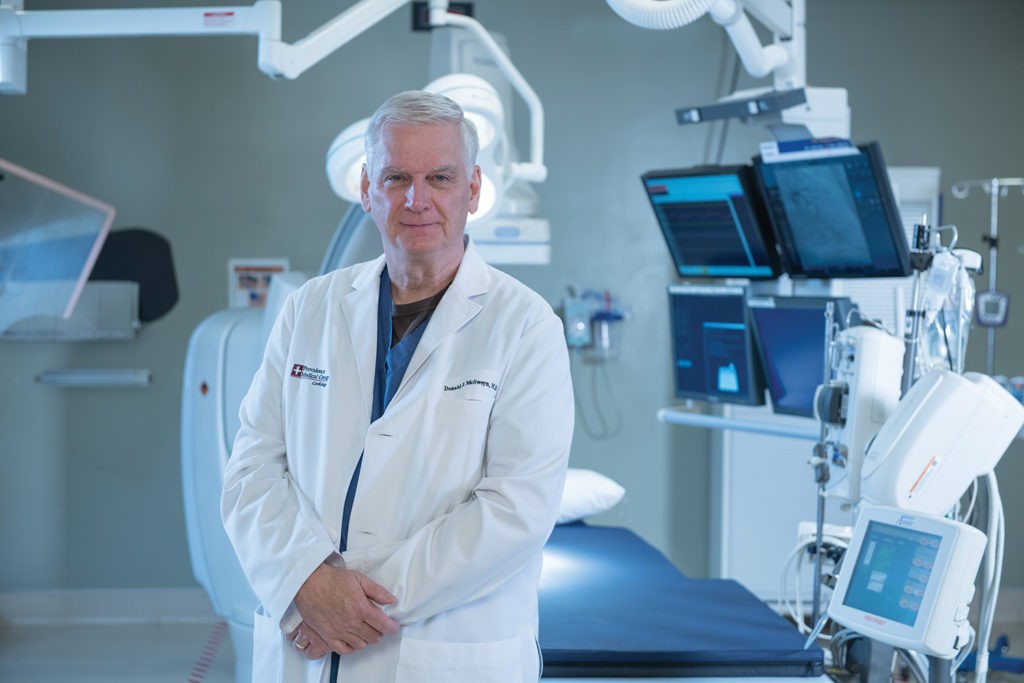
Donald J. McSweyn, M.D.
PMG-Cardiology stands as part of the Providence Medical Group network of physician practices with specialists and primary care locations in Basehor, Bonner Springs, Kansas City, Lansing and Leavenworth. Specialists at Providence also include surgeons, OB/GYN providers, neurologists, neurosurgeons and pain management specialists. Owned by Providence Medical Center, PMG offers the most advanced technology and medical expertise for emergency services, cardiac care, orthopedics, sports medicine, neurosurgery, cancer care, women’s services, interventional radiology, rehabilitation and so much more.
At the helm of PMG-Cardiology are Prashanth Katrapati, M.D., board-certified in internal medicine, cardiovascular disease, interventional cardiology, echocardiography and nuclear cardiology and also a fellowship-trained cardiologist with expertise in coronary, peripheral and structural heart interventions; Donald J. McSweyn, M.D., who is board certified in cardiovascular diseases and interventional cardiology, a fellow of the American College of Cardiology and the Society of Cardiovascular Angiography and Interventions with a special interest in the treatment and prevention of coronary artery disease; and Venkat R. Pasnoori, M.D., who is board certified in cardiovascular diseases, interventional cardiology and nuclear cardiology with expertise in coronary and peripheral vascular interventions, implantation of pacemakers and defibrillators, minimally invasive closure of holes in heart (PFOASD/VSD) and special interest in women’s cardiovascular health.
In addition to sharing the common denominator of being masters of their craft, committed to only providing the best in care, these three physicians also share a common thread in their love for the community they serve.
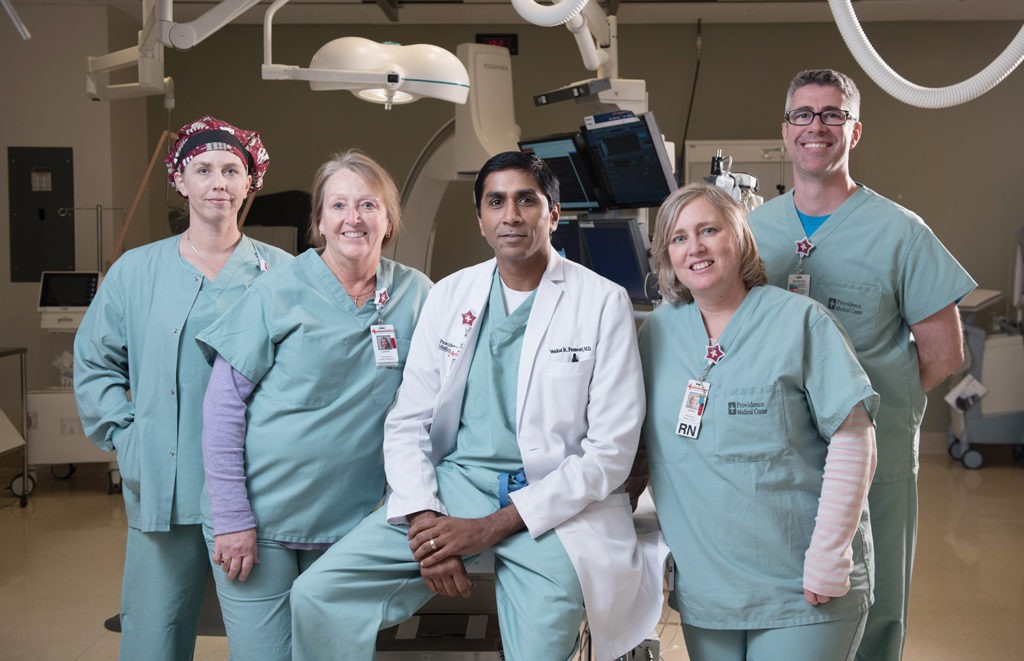
Venkat R. Pasnoori, M.D. and the Providence Medical Center Cardiology staff
“The advantages here are that, even though we are a smaller hospital, the quality of care is never compromised,” emphasized Dr. Katrapati. “We can offer patients all the services the larger hospitals offer, with the exception of heart transplants and extremely specialized ablations. We can handle basic care of the heart and even more complex disease issues here. Together, my partners and I can deliver the same type and multiple levels of care as the other hospitals.”
Dr. Pasnoori appreciates the community-based setting of Providence, emphasizing its aforementioned welcoming and personal presence.
“I love the community and feel that the people here really appreciate us,” he reflected. “It is inspiring to see the difference we can make in patients lives, as our primary goals for them are to live a pain-free life and improve outcome in general in terms of overall mortality.”
Dr. McSweyn added, “At Providence, the local community has a place for both routine care and emergency care. We’re able to provide both those things. We’re here if you need us for emergency issues or simply to maintain your care. Our full-service cardiology department provides interventional procedures, surgery and general cardiac care. Also, patients can typically get in the same day to see one of us if needed. Ninety-six percent of care one might need can be done here.”
As a result of the outstanding physicians, clinicians, staff, services and procedures offered by Providence Medical Center and PMG, the honors and accolades continually and deservedly flow to all departments. PMG-Cardiology in specific has been the notable recipient of the Five-Star Recipient for Treatment of Heart Failure in 2018 and the Five-Star Recipient for Pacemaker Procedures in 2018. From the perspective of patient safety, Providence Medical Center is the Recipient of the Healthgrades 2017 Patient Safety Excellence AwardTM and has been named among the Top 5% in the Nation for Patient Safety in 2017.
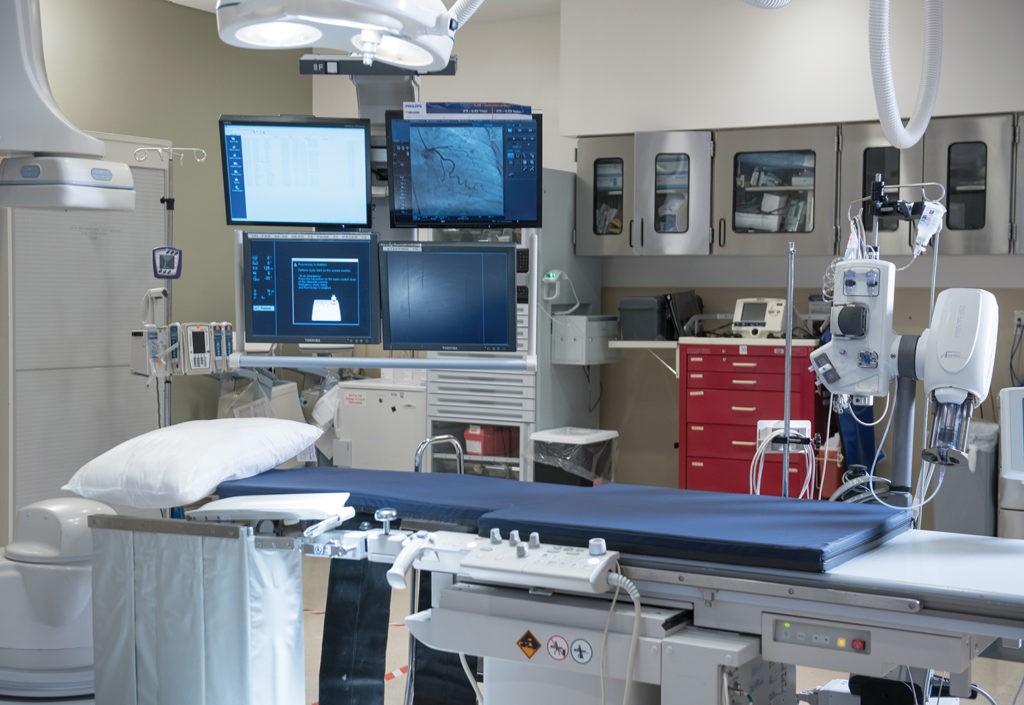
Providence Medical Center is the Recipient of the Healthgrades 2017 Patient Safety Excellence Award and has been named among the Top 5% in the Nation for Patient Safety in 2017.
For the physicians at PMG-Cardiology, their focus is less on the number of awards, however, and more on the number of lives they can save. A notable indication of that exists in its “door-to-balloon” time, which refers to the moment a patient comes in to the ER to the time the doctors are able to inflate a balloon to restore blood flow. Providence Medical Center instituted the Lifenet system one year ago to expedite treatment of heart attack patients. This is a comprehensive cloud based platform that helps EMS share critical data with the doctors, including EKG’s, from the field. National guidelines for the treatment of ST-segment elevation myocardial infarction recommend a time frame of 90 minutes or less for patients undergoing primary percutaneous coronary intervention.
“At Providence, we are way under that,” emphasized Dr. Katrapati, noting their typical “door-to-balloon” time, at approximately 55 minutes, is considerably lower than the national guidelines. “This is a metric we use to measure how well our staff is engaged in quality care and delivering that care. We can obtain information from the emergency medical responders prior to ambulance arrival so that we can then mobilize our teams at the hospital to be ready when the patient arrives. We strive to get that number as low as possible to prevent further damage to the heart muscle.”
Educating patients is also an integral part of PMG-Cardiology’s practice, and this is highly visible in its approach to a common, yet often unknown, cardiac disease known as Peripheral Arterial Disease or PAD, which refers to the narrowing of the arteries throughout the body. This condition typically presents in the legs and is the result of reduced blood flow to the area, causing pain. Sadly, over the next five years, one in four patients with PAD will sustain a heart attack, stroke, amputation or death. PMG-Cardiology wants to reverse that dynamic and encourages annual screenings for individuals 65 years of age and older and for those who are 55 years of age or older but have risk factors.
Although PAD presents as a disease about which many are unware, its related statistics suggest it is making a name for itself. PAD affects approximately 202 million people globally and roughly 8.5 million Americans over the age of 40. Incidences are more prevalent in women than in men. Individuals with diabetes and/or those who smoke have four times higher risk for developing this disease. Other risk factors include hypertension and high cholesterol, along with some hereditary influences. For every two patients with coronary artery disease (CAD), one will develop PAD. In fact, the majority of patients with PAD have co-existing CAD.
The symptoms of PAD include painful, cramping legs; achiness; and fatigue that occurs when walking but dissipates at rest. This phenomenon is referred to as claudication. Patients may experience foot or toe pain at rest that may disturb sleep. Individuals may also sustain skin wounds or ulcers on the feet or toes. However, half of patients with PAD may remain asymptomatic while others may present with atypical symptoms.
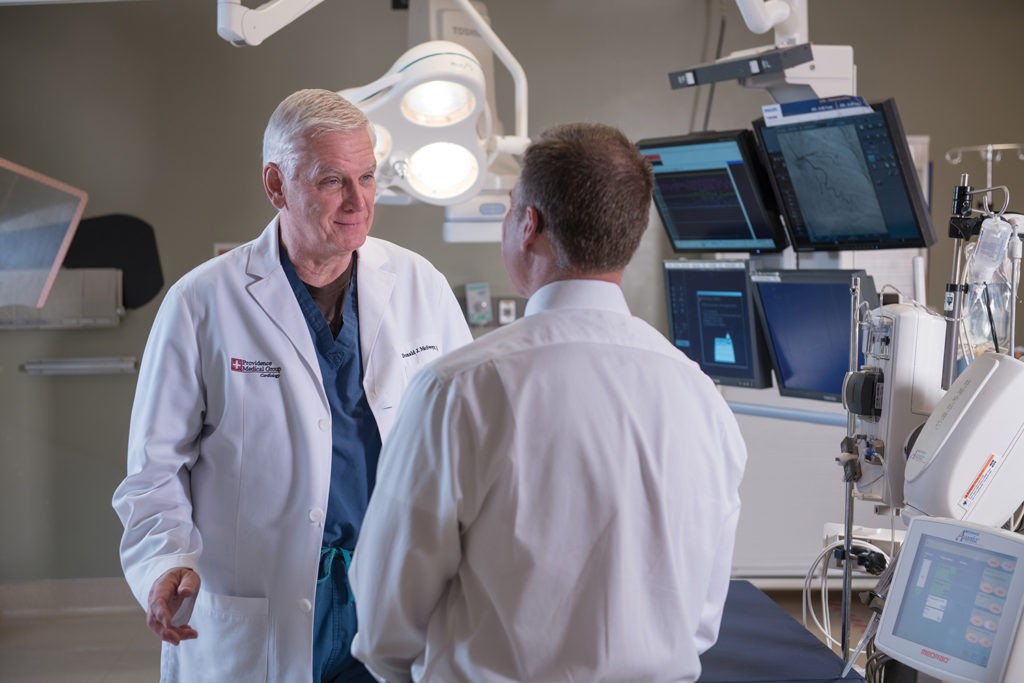
Donald J. McSweyn, M.D. discussing treatment options with patient and answering questions about the cardiac cath lab.
According to Dr. Pasnoori, when treating PAD, the goals are two-fold.
“We want to alleviate pain and to prevent amputation and heal non-healing wounds,” he expressed. He further emphasized this is accomplished through lifestyle changes (i.e. – diet and exercise) and certain interventional therapies, such as minimally invasive endovascular procedures. If and when necessary, more invasive surgical bypass procedures. The ultimate goal is to reduce the risk for heart attack, stroke or death by reducing the risk factors. With some patients, prescribed medications may also be indicated.
“Our goal is to restore a pain-free lifestyle and improve outcomes in general in terms of overall mortality, strokes and heart attacks for our patients,” said Dr. Pasnoori.
PMG-Cardiology offers steps individuals can take to improve vascular health. Initially, it is important to be familiar with your numbers, such as your blood pressure, cholesterol and blood glucose. Embracing a healthy lifestyle is equally important, and this includes cessation of smoking; maintaining a healthy weight or losing weight if you are overweight, eating low-fat meals high in fruits, vegetables and whole grain foods, and engaging in at least 30 minutes of physical activity most days of the week. Individuals with diabetes should continue working with their primary care provider and health care team on developing a solid diabetes care plan, which may also include taking medications as prescribed.
PMG-Cardiology is more than a life-saving team. They want to prevent amputation and seek early identification of risk factors, following through with proper PAD care.
“Our job is to identify preventable issues and control those,” explained Dr. Katrapati. “But if symptoms persist, then treatment is ideal. If a patient cannot control the risk factors through diet, exercise and other lifestyle modifications, that is an indication we need to intervene.”
Dr. Katrapati noted the first level of care in this regard involves the initial screening and asking the patients of any symptoms. That is followed by a thorough physical examination and finally introducing the use of QuantaFlo and/or an Ankle-brachial Index (ABI, which measures the ratio of blood pressure at the ankle to the blood pressure in the upper arm), technologies that will indicate significant decrease of blood flow to the legs. (Providence Medical Center offers a QuantaFloTM device in all of its primary care offices, our wound care center, and we have a mobile device we utilize at community provider offices and health fairs. For patients interested, contact PMG-Cardiology to learn more and schedule a screening.)
Thanks to the quality of care and the efficiency of systems at Providence Medical Center and PMG, patients are quickly treated and do not ever feel lost in the system.
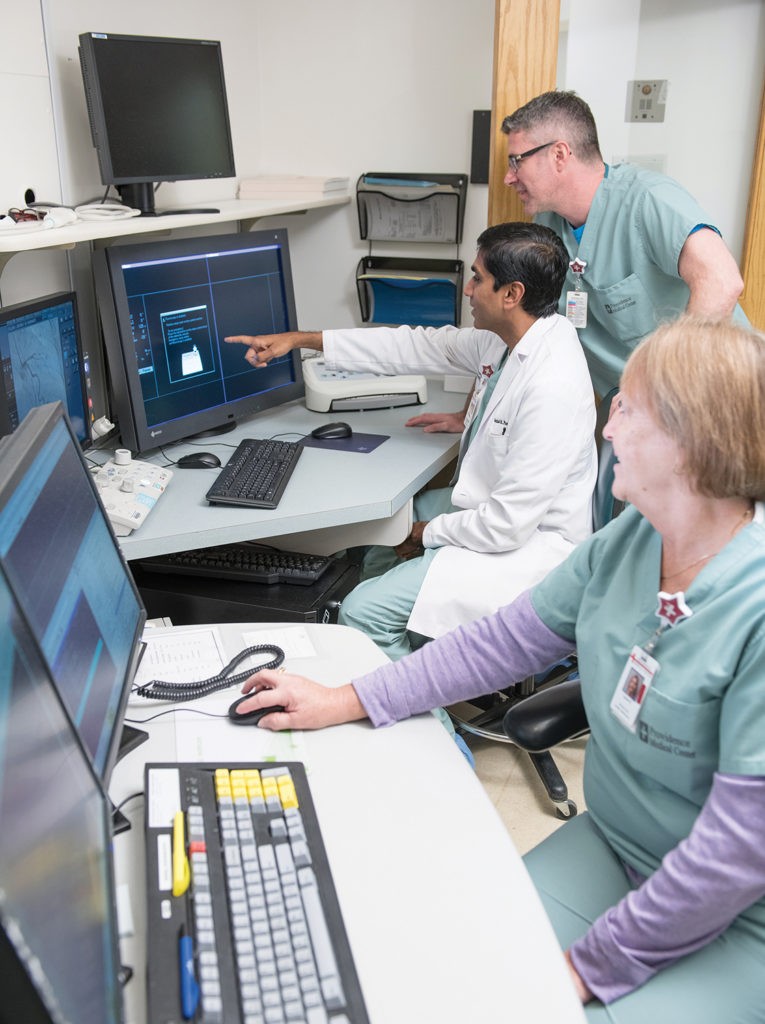
Venkat R. Pasnoori, M.D. consulting with cath lab team members after a successful procedure.
“We have a very good, up-to-date lab with updated technologies for coronary peripheral work, which is right by our office and close to the emergency room, all on the same level, allowing for ease of navigation for our patients,” indicated Dr. McSweyn, who also emphasized the dedication and unparalleled experience of the ER staff. “We have a great team here.”
As Providence Medical Center and PMG maintain their edge as outstanding leaders in the medical arena, they refuse to settle for the status quo. Always on the forefront of knowledge and understanding, this group of clinicians and staff take full advantage of opportunities for continuing education. To that end, Providence Medical Center and PMG-Cardiology is excited to announce its annual Dr. Maria Javaid Symposium, slated for February 8, 2018 at Children’s Mercy Park. This year’s focus is on the heart of women’s healthcare. This event is in memory of Dr. Javaid, who sadly lost her life in a small plane crash in 2014. Dr. Javaid served as a board certified interventional cardiologist, joining Providence Medical Center and Saint John Hospital in 2008. Her dedication to her patients, community and staff was palpable and her passion for her work unwavering. In addition to the symposium, the Providence Medical Center was recently renamed the Dr. Maria Javaid Cardiovascular Center in honor of her inspiring dedication to both her patients and the hospital.
PMG-Cardiology continues to prove itself as a trusted, caring, highly skilled and life-saving team of clinicians. As a result, patients will continue to enjoy improved overall quality of health and life, and these interventional cardiologists know they have found the right place to call their professional home.
“I came to Providence looking for a place that would help me grow in my career,” Dr. Katrapati commented. “As a cardiologist trained in all skills, I appreciate a place that allows me to use those skills, and the people I have met here stand out as individuals who are truly invested in the community. I am proud to be a part of that community. That is what inspired me to come here. I also am proud to work with amazing partners who share this sentiment and together we are able to deliver multiple levels of care.”

8919 Parallel Parkway, Kansas City, Kansas
913.596.7224 | providencemedicalgroupkc.com
